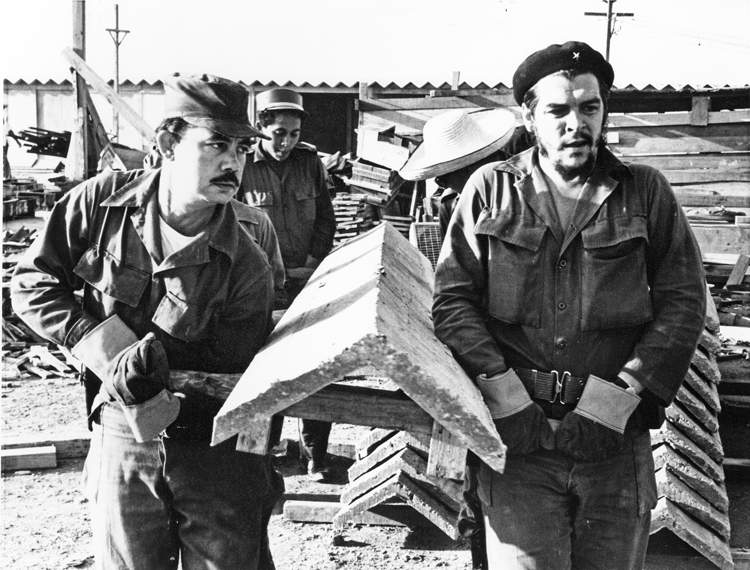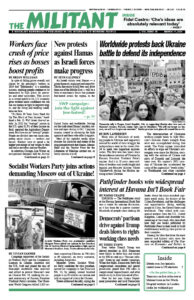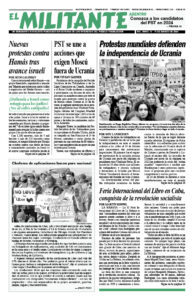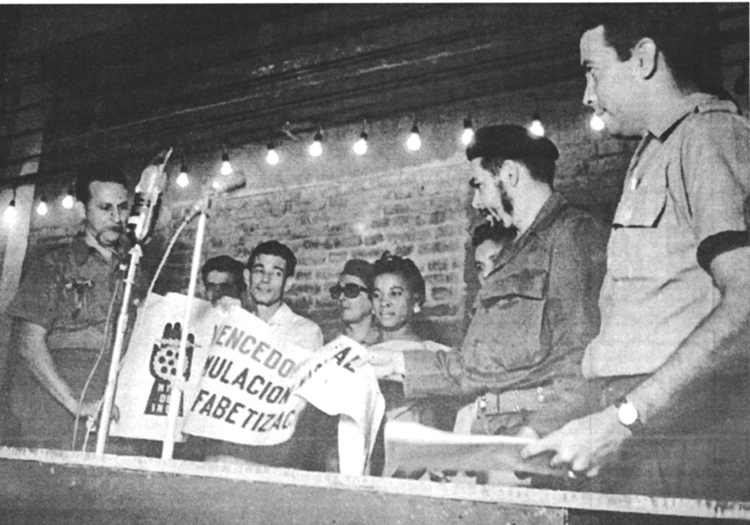The following excerpts are from the speech by Fidel Castro on Oct. 8, 1987, at the main ceremony marking the 20th anniversary of the death of Ernesto Che Guevara, held at the newly completed electronic components factory in Pinar del Río. It is reprinted from the new Pathfinder edition of Che Guevara on Economics and Politics in the Transition to Socialism by Carlos Tablada. The book is discussed in Fidel’s talk. Copyright © 2024 by Pathfinder Press. Reprinted by permission.
Our revolution is an example of what faith in man means because our revolution started from scratch, from nothing. We did not have a single weapon, we did not have a penny, even the men who started the struggle were unknown. And yet we confronted all that might, we confronted their hundreds of millions of pesos, we confronted the thousands of soldiers, and the revolution triumphed because we believed in man. Not only was victory made possible, but so was confronting the empire and getting this far, only a short way off from celebrating the twenty-ninth anniversary of the triumph of the revolution. How could we have done all this if we had not had faith in man?
Che had great faith in man. Che was a realist and did not reject material incentives. He deemed them necessary during the transitional stage, while building socialism. But Che attached more importance — more and more importance — to the conscious factor, to the moral factor.
At the same time, it would be a caricature to believe that Che was unrealistic and unfamiliar with the reality of a society and a people who had just emerged from capitalism.
But Che was mostly known as a man of action, a soldier, a leader, a military man, a guerrilla, an exemplary person who always was the first in everything; a man who never asked others to do something that he himself would not do first; a model of a righteous, honest, pure, courageous man, full of human solidarity. These are the virtues he possessed and the ones we remember him by.

Che was a man of very profound thought, and he had the exceptional opportunity during the first years of the revolution to delve deeply into very important aspects of the building of socialism, because, given his qualities, whenever a man was needed to do an important job, Che was always there. He was truly a many-sided man and, whatever his assignment, he fulfilled it in a completely serious and responsible manner.
He was in INRA [National Institute of Agrarian Reform] and managed a few industries under its jurisdiction at a time when the main industries had not yet been nationalized and only a few factories had been taken over. He headed the National Bank, another of the responsibilities entrusted to him, and he also headed the Ministry of Industry when this agency was set up.
Nearly all the factories had been nationalized by then and everything had to be organized, production had to be maintained, and Che took on the job, as he had taken on many others. He did so with total devotion, working day and night, Saturdays and Sundays, at all hours, and he really set out to solve far-reaching problems. It was then that he tackled the task of applying Marxist-Leninist principles to the organization of production, the way he understood it, the way he saw it.
He spent years doing that; he spoke a lot, wrote a lot on all those subjects. And he really managed to develop a rather elaborate and very profound theory on the manner in which, in his opinion, socialism should be built leading to a communist society.
Recently, all these ideas were compiled, and an economist wrote a book that was awarded a Casa de las Américas prize. The author compiled, studied, and presented in a book the essence of Che’s economic ideas, retrieved from many of his speeches and writings — articles and speeches dealing with a subject so decisive in the building of socialism. The name of the book is The Economic Thought of Ernesto Che Guevara. So much has been done to recall his other qualities that this aspect, I think, is largely unknown in our country. Che held truly profound, courageous, bold ideas, which were different from many paths already taken.
In essence — in essence! — Che was radically opposed to using and developing capitalist economic laws and categories in building socialism. He advocated something that I have often insisted on: Building socialism and communism is not just a matter of producing and distributing wealth but is also a matter of education and consciousness. He was firmly opposed to using these categories, which have been transferred from capitalism to socialism, as instruments to build the new society.
* * *
If there is something left to say tonight it’s that despite our problems; despite the fact that we have less hard currency than ever before, for reasons we’ve explained in the past; despite the drought; despite the intensification of the imperialist blockade — as I see our people respond, as I see more and more possibilities open up, I feel confident, I feel optimistic. And I am absolutely convinced we will accomplish everything we set our minds to! [Applause]
We’ll do it with the people, with the masses. We’ll do it with the principles, pride, and honor of each and every one of our party members, workers, youth, peasants, and intellectuals!
I can proudly say that we are giving Che well-deserved tribute and honor, and if he lives more than ever, so will the homeland! If he is an opponent of imperialism more powerful than ever, the homeland will also be more powerful than ever against imperialism and its rotten ideology! [Applause]
And if one day we chose the path of revolution, of socialist revolution and of communism, the path of building communism, today we are prouder to have chosen that path because it is the only one that can give rise to men like Che and can forge a people made up of millions of men and women capable of being like Che! [Applause]
As [José] Martí said, whereas there are men without dignity, there are also men who carry inside them the dignity of many men! We might add that there are men who carry inside them the dignity of the world, and one of those men is Che!
Patria o muerte! [Homeland or death]
Venceremos! [We will win] [Ovation]


